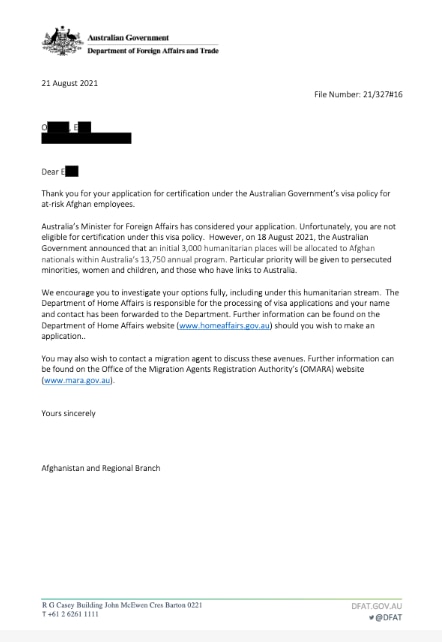Australia backflips on decision to reject visas for former Kabul embassy guards
The federal government has backflipped on its decision to deny visas to more than 100 former security guards who worked at the Australian embassy in Kabul, and says it will now grant them visas "in another humanitarian category".
The former guards, who worked as contractors rather than direct employees, were initially told they would not be allowed to apply for special refugee visas reserved for former staff.
On Saturday, the Department of Foreign Affairs issued some of the rejection letters to the group, telling them they were ineligible to apply for the special visas reserved for Afghans who worked alongside Australian agencies, called the locally engaged employee visa.
Under the current program, former staff must obtain certification, or proof of their employment, from the Department in order to proceed to the next step to apply for the visas.
“Thank you for your application for certification under the Australian Government’s visa policy for at-risk employees,†the letter reads.
“Unfortunately you are not eligible for certification under this visa policy.â€
Employees of Australia’s embassy were told in the days after its closure in late May they would be eligible to apply for the visas.

The letter sent by DFAT to Afghans who worked as guards at the Australian embassy in Kabul.
Supplied
In the letter, no reason is given for the certification rejection, but it encourages the applicant to consider the main humanitarian visa stream, of which Australia is offering 3,000 places.
Now it seems the security guards have already been approved for humanitarian visas following a government statement on Sunday.
"The security guards referred to in media reports today were not eligible for the restricted locally engaged employee visas but have already been approved for visas in another humanitarian category," the spokesperson said.
The government statement said every applicant who does not meet the criteria of the category of at-risk employees now has their application forwarded automatically to the Department of Home Affairs to be automatically considered under another humanitarian stream.
"This streamlining of processes reflects the fact that the special visa category for locally engaged employees has always been restricted to that group, while the general humanitarian category is not," the spokesperson said.
But while the humanitarian visas for the former security guards have been approved, it remains unclear whether they would be able to get on an evacuation flight from the country before the Australian government pulls out of the rescue effort at the end of the month.
An embassy guard who says he worked at the embassy right up until its closure said he’s in hiding and fears for his life, following the country's takeover by the Taliban.
“I already feel disappointed because I am like a prisoner at home - I can’t get out,†he told SBS News.
“Everyday there is news that the Taliban will begin searching house by house ... for those who served with the military and those who worked with foreign forces.â€
Before the government made a U-turn on its decision, the guard said he hoped it would be overturned.
“We serve with loyalty and honesty at the embassy and we do not deserve the Australian government to turn their backs on us," he said.
“We served them, we protected them and put our lives in danger.â€
Military lawyer Glenn Kolomeitz, who has been working to secure visas for many locally engaged employees, said the rejection letters were an impediment to help at-risk former staff.
“We are trying to save lives whilst being actively obstructed by bureaucrats in Canberra,†he told SBS News.
“This entire shameful episode will be subject to judicial scrutiny in coming months and, hopefully, parliamentary scrutiny in coming years."
He said it was unclear why some had been rejected while others were cleared to apply for the visas.
“Having read the acceptance and rejection letters there is no rhyme nor reason why some have been accepted but most have been rejected.
"Same job, same embassy, same risk to life - with somebody in Canberra now deciding who to throw to the wolves on an apparent whim."
With additional reporting by Caroline Riches
0 Response to "Australia backflips on decision to reject visas for former Kabul embassy guards"
Post a Comment